Well, there goes another month. November is flying out the same way it flew in–quickly. The door is opened to December and time shows no signs of stopping. Which, I’ll happily point out, is a good thing! Although some slowing might be nice.
Here in the US we are bracing for another wave of Covid19. And although I’m sick of it all already, as I presume many of you are, it’s here and happening. In a previous post, I mentioned I wrote an essay about the early days of the pandemic that was published in an anthology: TAF Stays Home.
Since I think a lot of us are staying home as much as possible, and many of us are now under stronger restrictions, I thought I’d share my essay. The title is Nesting and that’s exactly how it felt for me during March, April, May especially. I also spent a lot of time outside, which I always do. That wasn’t out of the ordinary for me. But somehow the world seemed different and quieter and more manageable. But for the full story, read on. To quote a good friend that I miss dearly: “Thanks so much for coming by today. I’m so happy that you did.” (RIP Pauline)
Nesting
February was relatively normal. I spent the last days of the month and the first few days of March at the Virginia Center for the Creative Arts. My first writer’s residency was colored with worry from the beginning. The night before I arrived, my older sister was admitted to the hospital with symptoms that suggested either heart problems or stroke. There was also vague news of something called a novel coronavirus happening somewhere else in the world. It didn’t seem too serious, I reasoned, or certainly, our officials would have shared more information. I vowed not to check the news while I was away. When I received an email from a friend asking how my relatives in Italy were doing, I broke my vow. Things suddenly began to look more grim. A feeling of nagging anxiety nibbled away at my attention. I had very little focus left for the writing I had spent months planning to accomplish while there. Fortunately for me, the VCCA is located on top of a mountain, some say magical, surrounded by beautiful pastoral landscape. If I couldn’t write, I would take to the wooded trails to revive my weary heart and stoke my imagination. I’ve always counted on nature for solace, and she has never let me down.
When I arrive home, the news becomes more dire as we learn about the global implications of this coronavirus. The word pandemic is tossed around in daily conversation. I know what an historical pandemic is, but what is a pandemic here? And what does it mean for humans now?
I start my research by consulting Merriam-Webster online.
Pandemic: from Greek pandēmos of all the people; pan- all, and dēmos people.
All people. All people everywhere are affected by this novel coronavirus pandemic.
Of course, each of is are affected in our own unique ways. Much depends on where we live and our financial and community resources. It would be misleading to say I have personally suffered through this disorienting time. But I grieve for the suffering of others. I feel their pain on a visceral level. We are early in the disease’s progression and I understand anything could happen at any time. For now, I’m grateful to have a garden. For three decades, I’ve worked hard to transform a backyard into a habitat where I’m surrounded by beauty and cradled by Mother Nature. This less-than-half-acre property is a sanctuary for me. A place of retreat. A nest, if you will.
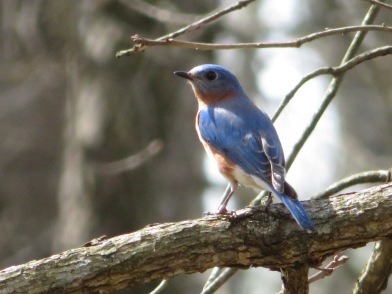
An ornithological call and response wakens me every morning at 6 am: cardinals, Carolina wrens, and titmice. The mourning doves punctuate verses with their soulful coo-coo-coooo, and towhees provide the shrill coda. Every evening, white-throated sparrows call me out to the pergola swing to listen to their day-fading-to-dusk chorale. Sitting atop fenceposts, heads tilted back in fervor despite darkening skies, they belt harmonies that soothe frayed nerves and prophesy the promise of the coming morrow. Are the tweets and chirps louder this year, I wonder? Are more birds coming to my garden to sing, feed, and raise a family? On a sunny April afternoon, I count fourteen species within a few moments. Am I paying more attention, or is nature filling in the space and silences the coronavirus pandemic created in my daily life?
I watch as bluebirds prepare a nest in the bluebird box. Some weeks later, I observe Momma and Poppa bluebird taking turns feeding fragile, pink-skinned, bald baby birds minute pieces of insects and worms scavenged from around my garden. The fledglings eventually fly to independence while I’m not looking. I find tiny blue-etched feathers lying near the frog pond, but I must trust all three made it safely to the skies and are faring well. I must have faith to survive these days.
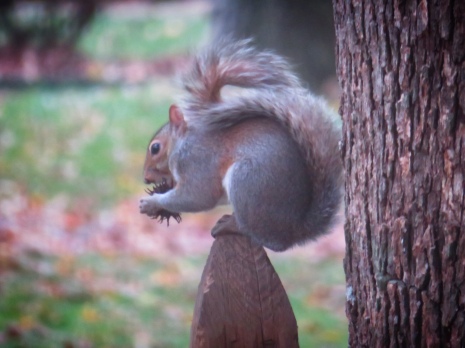
The squirrels in my backyard seem to have unquestionable faith. They build a nest, called a drey, in an old oak tree hollowed out by a lightning strike years ago. They spent the last days of 2019 stuffing leaves and twigs into the slender gash. I look up, waiting for the day babies will emerge. A red-tailed hawk waits, too, on a nearby limb, and I recall a favorite poem from U.S. Poet Laureate, Joy Harjo: “Who would believe the fantastic and terrible story of all of our survival those who were never meant to survive.”
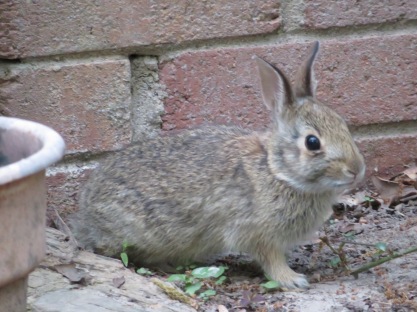
In mid-March, I accidentally uncover newborn bunnies snuggling in a grass-lined nest under a viburnum. I tuck them back in and some days later see hungry baby bunnies eating irises, painted ferns, and my most-treasured plant, a dainty pink anemonella that sways in the spring wind under tall oaks, or used to. How can I mind? The bunnies are doing what they need to do to survive. Same as the mice who scurry under the bird feeders, once the cardinals cease their twilight prayers. Tiny claws scratch over pebbles as they, too, forage for the seeded remains of the day.
I cannot help but notice the world has suddenly become the peaceable kingdom. Reports from around the globe echo what I am witnessing in my neighborhood. There are more birds, rabbits, and squirrels dashing around my community. Neighbors report coyote sightings. “More than usual!” they shout from the sidewalk as we safely self-distance. We decide it’s the reduced number of cars on the road. Less traffic means fewer car horns and alarms piercing the air. The frequency of police and fire sirens also decreases. I still have to contend with the whirr of lawnmowers and leaf blowers, but other than that, my already-quiet neighborhood is quieter than any other time.
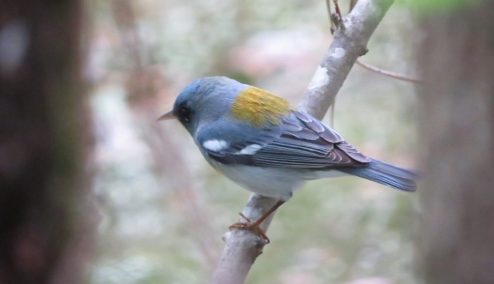
Every day the death toll rises. With each evening’s press conference, I grow wearier and more frustrated. Every morning I walk out my back door and through my garden to open the double-wide gate. I offer passersby a view into my hortus conclusus. I built my enclosed garden years ago, even before I discovered I was an extreme introvert. And yet, I want to be neighborly, so I made the openings extra wide to allow for a peek inside. Who knows if the heavenly scented clematis, alien-looking aroids, and multihued paeonies will perhaps create a spark of joy or grant a sense of hope to others as much as they do me?
I’m a writer, and regardless of what is going on, I have deadlines to meet. Although there are days when I cannot think one coherent thought, I know I will survive these strange times much better If I can conjure up some semblance of normalcy. But what is normal now? And what will normal be moving forward? On good days, I put pen to paper and try to create stories that will sustain us. Or, at the very least, sustain me.
I’ve tended this plot for the last thirty years and, without question, my garden has never looked this beautiful or healthy. Even though I didn’t get to shop at the nurseries this spring, I nurtured existing plants by giving them layers of well-aged compost and shredded leaf mulch. They rewarded me with incredible growth. Spring is symbolic of growth and new life, so it is disorienting to hear about thousands of deaths and read obituaries that go on page after page after page. It is difficult to play in my garden when others are suffering on a scale that overwhelms the mind and emotions.
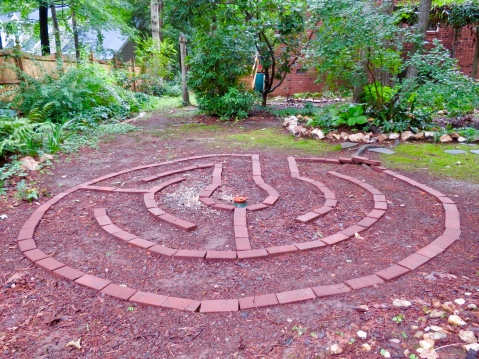
When I need to reset my mental equilibrium, I walk the brick labyrinth in my backyard. I breathe in and out as I make the pilgrimage from outer to inner and back out again. I whisper prayers for my family, my friends, and all people. All people everywhere enduring this pandemic. Taking tiny steps around each curve, I search my heart for the joy that seems to have disappeared. Anxiety and worry may mask joyfulness temporarily, but I know it’s there, albeit below the surface. Like sunshine covered by grey clouds, joy always appears in time. Hope is another feeling that ultimately emerges after a dark night. Signs of joy and hope shine through our shared experiences: colorful paper hearts taped to windows, stuffed bears placed where children walking by can see them, families writing messages of optimism in sidewalk chalk, stories of normal folks performing great acts of kindness.
What other stories will come out of this time? There will be stories of loss, grief, and fear, for sure. But there will also be tales of courage, optimism, and hope. The stories are still being written while I sit here on my porch swing and listen as birds deliver morning sermons and sing evening vespers. And like always, I continue to find comfort and peace in my garden. When the news becomes too much to bear and the world is too much with me, I drop to my knees and blend in with the green, pink, red, and lavender that surrounds me. And dig my hands into the cool, brown earth.
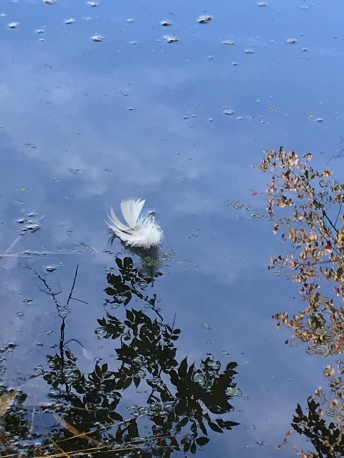
Cheryl Capaldo Traylor is a freelance writer who enjoys writing about nature, gardening, and the environment for several regional publications in North Carolina. She graduated from Duke University with a Master’s Degree in Interdisciplinary Studies. She writes about place, belonging, and our human connection to landscape at www.GivingVoicetoMyAstonishment.com.
Beautifully written, Cheryl. I can totally empathise with nature and the outdoors being the primary solace for you – same for me, and I hope, many of us. In fact, just before I read your post, I looked through the window and decided I will crack on earlier than usual, if there are some decent weather days, to prepare the garden for spring. I wouldn’t usually ‘go in’ at this time, but I feel the need. The situation with the virus is becoming alarmingly bad over here in the UK – numbers accelerating and the NHS will soon be overwhelmed for sure in the next few weeks after Christmas. Just dire! And I’m sick of groundhog day restrictions, but really shouldnt complain. Thank you for showing bluebirds again – I hope to see them, and fireflies, one day :>)
LikeLiked by 1 person
Thanks so much, Lynne. I hope you’ll see them, too! Fireflies are magical. Covid is spreading rapidly here, too. But vaccinations are starting to roll out. I think the next couple of months will be really bad, and then maybe a decrease in cases. Although, I believe it will be a while before it’s completely under control. Until then… we garden. x
LikeLiked by 1 person
Beautiful, Cheryl!
LikeLike
A beautiful essay Cheryl. It took me back to those early days when I too realised that this was something more serious than I’d thought, then through those quieter months when nature sustained us all. November really has passed in a flash, as so many months have this year – although when you look back it seems as though the year has gone on forever.
LikeLiked by 1 person
Perfectly said, Andrea. The days and months fly by, although this year has seemed longer than usual. Thanks so much for reading.
LikeLiked by 1 person
Your essay touches the heart in so many ways, especially with your mention of Pauline. These lines I’ll hold close: “Anxiety and worry may mask joyfulness temporarily, but I know it’s there, albeit below the surface. Like sunshine covered by grey clouds, joy always appears in time. Hope is another feeling that ultimately emerges after a dark night.” I feel so fortunate that I’ve been merely inconvenienced by COVID, and even that inconvenience doesn’t feel like a burden given my introversion. I often feel that the only reason I’ve lasted as long as I have in my current position at work is because I can work at home, away the cacophony of hallway conversations and conference calls and a boss who likes to run down the hallway in her high heels. That said, I’m so relieved to read in your comments that all is well with your family. So many have suffered, so many are suffering. I’m grateful that you have your garden, your balm and your inspiration.
LikeLiked by 1 person
Thank you, Marie. You’re right about the suffering. I fear it is about to get worse. I’m glad I can get out in my garden every day. So many others will have to stay inside with the cold weather. I’m happy you are nearing retirement. That should bring more joy to your days:)
LikeLiked by 1 person
We went for a hike today. It was blustery and cold and I feel nicely fatigued. I had taken today off because it’s Greg birthday. I do look forward to having more days like this 🙂
LikeLiked by 1 person
A lovely essay, expressing what many of us have felt.
LikeLiked by 1 person
Thanks so much, Merril. I do find solace in the words and blogs of others. This community of writers, artists, creatives, and poets sustains me.
LikeLiked by 1 person
Me, as well.
LikeLike
Cheryl, what a beautiful piece. And how fortunate you are to find such solace in your garden. And you are so right in that along with the stories of fear and tragedy are those of optimism and hope. It is such a challenging time, and writing is a way of working through. How kind of you to open your gates so others may feel lifted. We all can do something, I agree. And I, too, have heard so many stories of wildlife and bird populations rebounding without humans to run them down (sadly) – and around the world. Hang in, Cheryl. We’ll get there. ❤️ Jeanne
LikeLiked by 1 person
Thanks, Jeanne. There are many inspiring stories. I recall the one you shared about the NY hospital playing Here Comes the Sun. I think about that a lot. We will get there! ❤️
LikeLike
I think about that quite often, myself. 🙂 Wow – we’re having thunderstorms now!!
LikeLiked by 1 person
I love the brick labyrinth. I have little one on the wall which I run my finger around to stay calm, but I think you have given me food for thought.
Stay well🌞
LikeLiked by 1 person
Thanks, Cathy. The labyrinth is one of the best structures in my garden. It’s smallish, but I walk it most days, at least once.
LikeLike
A lovely essay which is still living on and on as we face each pandemic affected day. I am taken in by the changes for good in the natural world and, really, isn’t the natural world the world as it is meant to be? If it means they get to have what they need I bet we will get what we need, as well. It’s balance and that is something I think the universe needed a wake up call over. I am ready for the pandemic to be done, but I am not ready for business as usual because, to me, usual is not normal. But…that’s just me… I am sorry for your loss of Pauline. Hugs to you
LikeLiked by 1 person
Thank you, Lisa. I agree about “back to normal.” I think normal wasn’t working so well. I’d like to start with awareness and empathy for all. Then, figure out how to make a new “normal” work. And what is normal, really? Who was it that said normal is just a setting on the washer? 🤣 There are many silver linings to this pandemic, but there not always easy to see. Hindsight, I guess.
LikeLiked by 1 person
Yesterday, I wrote a list of 20 reasons 2020 was a good year for me. It turned a lot of things around for me to do that list.
LikeLiked by 1 person
I’ve made that list in my head. I think I will write it down and post it on the fridge.
LikeLiked by 1 person
Thank you for these insightful and thoughtful comments. Much wisdom contained in them. May the peace of God which passes all understanding keep your heart and mind in the knowledge of His son, Jesus Christ.
LikeLiked by 1 person
Thank you so much.
LikeLike
Beautiful writing and photography, Cheryl. And thank you for the reminder of Pauline – I’d know that quotation anywhere.
LikeLiked by 1 person
Thank you, Derrick. Losing Pauline was like losing a family member. Somehow, she created space for everyone in her life. I know she’s missed by many.
LikeLiked by 1 person
Indeed X
LikeLiked by 1 person
Thank God for the garden — at all times, but especially now. The big question — what about your sister and relatives in Italy? Hopefully, they are AOK. Thankfully, you and presumably your husband are too.
LikeLiked by 1 person
Yes, especially now. We are all doing well and I hope you are, too. Thanks for asking.
LikeLiked by 1 person
We’ve been blessed with unseasonably warm weather which has extended outdoor time. Thank God.
LikeLiked by 1 person